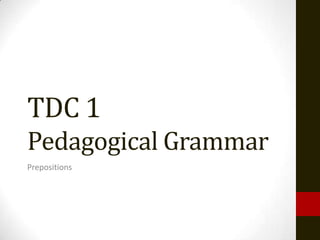
Grammar of prepositions
- 2. Prepositions - Prepositions are small words, but probably the most difficult ones to use correctly. - Common examples are at, for, from, in, of, on, to. Typical ELL Errors (Can you correct them?) - After that, all you have to do is wait your passport to come back with a Brazilian tourist visa in it. - I want to thank you so much for to call me while I was in the hospital. Your call meant a lot to me. - However, I was involved an accident last Sunday, and I couldn’t call you. - I know you’re very busy now, so thanks for wrote an e-mail at this time. - My friend and I bought an apartment in Argentina, so I’m pretty sure that I will go there on August.
- 3. Prepositions Why are prepositions so difficult? 1) Prepositions do not translate well from one language to another. . English: I am in love with Janet. . Portuguese: Estou apaixonado por Janet. (for?) . Spanish: Estoy enamorado de Janet. (of?) 2) In English, many times the same preposition has different uses. . on the wall, on the table, on Friday . on May street, on second thought
- 4. Prepositions Why are prepositions so difficult? (cont.) 3) A language may not have any one-word to express the same concept. . They walked along the river. (= to continue the lengh of) 4) Some languages do not require a preposition after some words, different from English. And some languages require a preposition after some words, different from English. . English: I walk through the park. . Japanese: I walk the park. . English: I entered the room. . Portuguese: I entered in the room.
- 5. Prepositions Why are prepositions so difficult? (cont.) 5) Some languages do not use prepositions in the same way done in English. . English: I go to the post office for stamps. (PREpositions) . Japanese: Stamps’ purpose post office to I go. (POSTpositions) 6) Prepositions in idiomatic expressions are hard to translate. . in love with someone / up to you / of course . at odds with someone / kind of / down the road
- 6. Prepositions - a word that shows the relationship between a noun (or a pronoun) and the rest of the words in the sentence. - many purposes (mainly place, time and directions) Prepositional Phases - a combination of a preposition and its object (noun / pronoun / modifier(s) + noun) on Tuesday in the middle at a secret location (prep + noun) (prep + art + noun) (prep + art + adj + noun)
- 7. Prepositional Phases - The position of prepositional phrases in a sentence most of the times confuse ELLs. BEGINNING In northern China, the weather can be very cold. MIDDLE Zina worked in northern China for several years. END Dr. Kevin teaches at a college in northern China. What ELLs should know - We usually use a comma after prepositional phrases in the beginning of sentences. - No comma is used when the prepositional phrase occurs at the end of the sentence.
- 8. Prepositional Phases - When a sentence has a prepositional phrase of place and a prepositional phrase of time, which one do we normally place first? Engineers discovered oil _______________ _______________. in 1901 in Texas 1 2 - When a sentence has two or more prepositional phrases of place, or two or more prepositional phrases of time, how do we place them? Your dictionary is ____________ ____________ ____________ 1 2 3 on the table in the kitchen in the box
- 9. Prepositional Phases - When a sentence has a prepositional phrase of place and a prepositional phrase of time, which one do we normally place first? in Texas in 1901 Engineers discovered oil _______________ _______________. 1 2 - When a sentence has two or more prepositional phrases of place, or two or more prepositional phrases of time, how do we place them? in the box on the table in the kitchen Your dictionary is ____________ ____________ ____________ 1 2 3
- 10. Prepositions - Prepositions are countless. - We should focus on the most frequently used. One-word Prepositions – Pages 164/165/166 Two-word Prepositions – Page 166 Three-word Prepositions – Page 167
- 11. Prepositions (AT / ON / IN) smaller PLACE TIME smaller at MacDonald’s at at 5:00 PM on Green Street on on Monday in San Francisco in July in California in the summer in the United in in 1996 States bigger Special Idiomatic Expressions Rooms at Home bigger - in the morning / - in the kitchen/ afternoon / evening bedroom/ bathroom - at night
- 12. Problem Prepositions For vs. Since – Page 170 Before vs. Ago – Page 170 In vs. After – Page 170 For vs. During – Page 171 Verbs of Motion – Page 171 Preposition Combinations Adjective + Prepositions – Page 172 Nouns + Prepositions – Page 173 Prepositions + Nouns – Page 173 Verbs + Prepositions – Page 174
